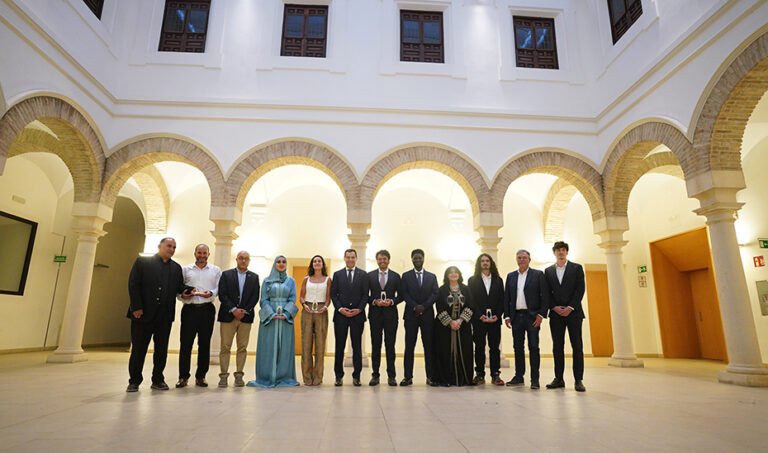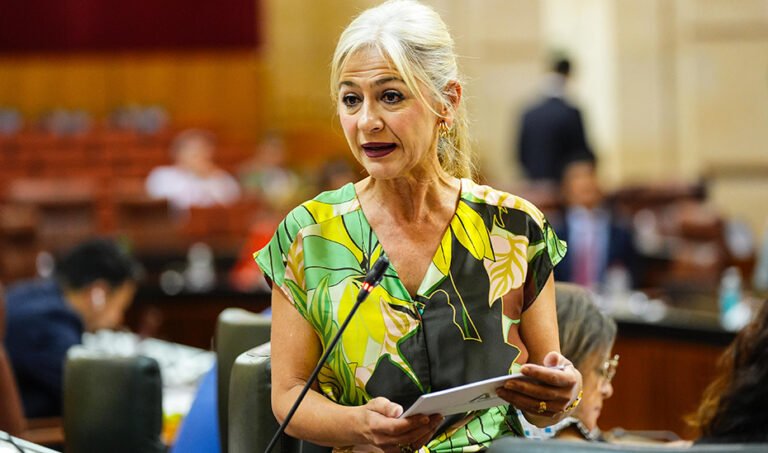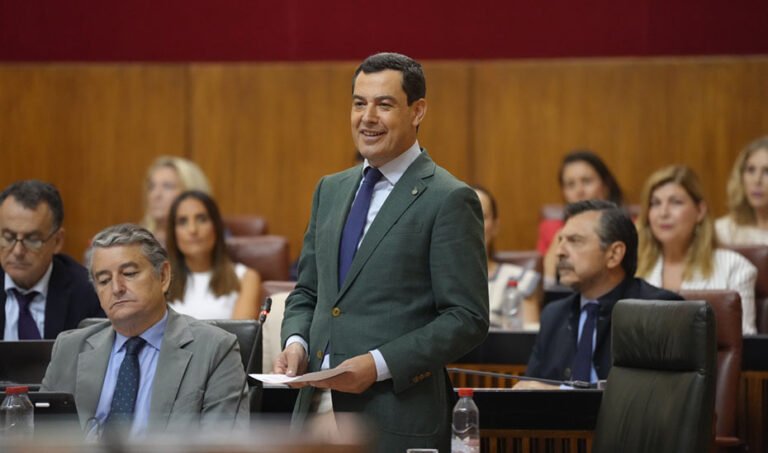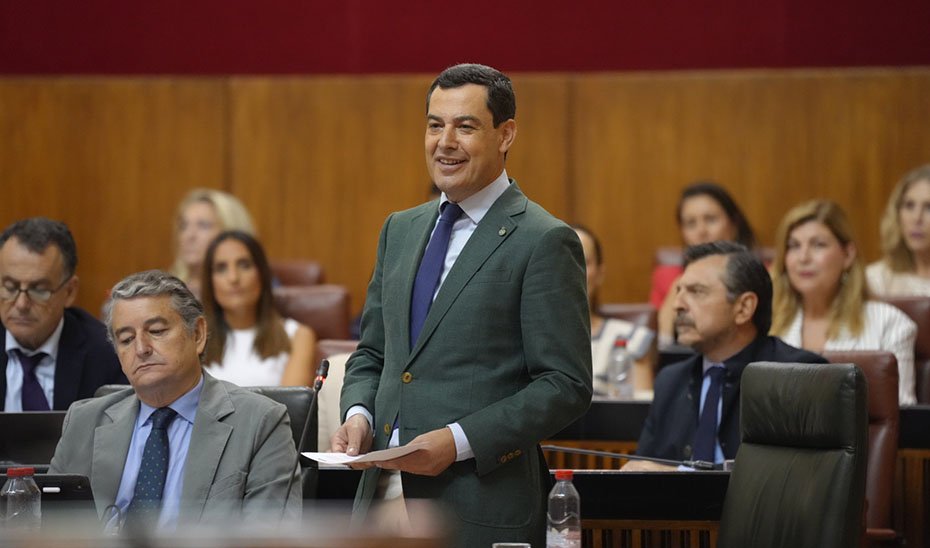
El presidente de la Junta de Andalucía, Juanma Moreno, ha afirmado que hablar de ética en la política es hablar de principios como la honestidad, la transparencia, el buen hacer en la gestión pública, pero también es hablar de acuerdos y de ser leales con estos.
During his intervention in the question time in the Andalusian Parliament, Moreno referred to the historic agreement reached with education unions that will have an impact in the upcoming academic year 25/26. The agreement includes structural measures such as reinforcing the staff with over 2,500 teachers, reducing the student-teacher ratio to 22 in the second cycle of early childhood education, reinforcing staff to support diversity in primary and secondary education in schools with higher ratios, reinforcing special education staff, measures for streamlining bureaucracy, and the reinstatement of the Chair Access Call for secondary school teaching staff.
He emphasized that this agreement involves the incorporation of over 6,000 professionals into the system, in addition to those already agreed upon within the Sectorial Table.
He stated that this is a milestone as it means redesigning the structure of the educational system for the decades to come and he thanked the trade unions for their dialogical attitude and constructive spirit in reaching agreements.
Juanma Moreno’s appearance before parliamentary groups.
On another note, he asserted that when the Junta detects any signs of corruption or fraud, it reports it to the Public Prosecutor’s Office, as was the case with the alleged fraud in school transport contracts in Cadiz. «The Public Agency opened proceedings, dismissed the employee after conducting an inquiry. The General Intervention was informed, and the case was referred to the Public Prosecutor’s Office. We also did the same in 2022 with Covid tests, reporting attempts of fraud with medical supplies to the Prosecutor’s Office.»
The Andalusian President emphasized that the Andalusian Government handles public funds of all Andalusians with great care, allocating them according to the budget and not elsewhere.
In this regard, he highlighted the annual budget approval, which represents an exercise in transparency, combined with a consolidated budget with instrumental entities, including an annex of personnel and an annex with provincialized investments.
He also emphasized the creation of a budget viewer to make information more accessible to citizens, enabling them to understand how public resources are utilized in a straightforward manner.
Regarding this, he mentioned the establishment of mechanisms for controlling public funds such as the creation of superior and technical bodies of specific auditors and auditors (Law 7/2023) with the aim of having a group of highly qualified officials for greater control; the General Directorate of Contracting and the implementation of electronic systems (SiREC) which provide greater controls and transparency in all public contracting, and the replacement of prior expenditure supervision with ongoing financial control.
In this regard, he explained that prior expenditure supervision is limited to compliance with economic-budgetary legality, with a very limited scope, and that ongoing financial control has a much broader scope, analyzing not only legality but also the effectiveness and efficiency of public expenditure.
«With all these measures, we aim to prevent cases of corruption like the ones we have experienced in the past. The EREs or the Faffe are macro-cases that, to this day, are still in court, involving a diversion of public funds for favors and friendly companies.»
Furthermore, in light of recent news, he lamented that essential works for Andalusia’s mobility are experiencing cost overruns and delays, adding that they have requested the Spanish Government to properly audit and scrutinize all works under judicial investigation to analyze whether there have been cost overruns, budget deviations, and to determine the relevant responsibilities.
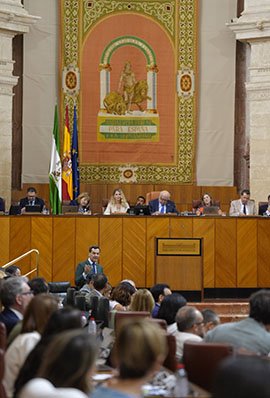
The Andalusian President during a moment of the question time in the regional Parliament.
Youth, the present and future of our society
Moreno referred to young people, defining them as the present and future of our society, urging all institutions to be aware and sensitive to their problems, needs, and aspirations.
«This Government listens to them and has policies to assist them. We act in many areas, striving to create opportunities for them to develop a life project.»
Regarding training, he highlighted the boost to Vocational Training with 47,522 more places sustained by public funds, nearly 170,000 in total, and almost 3,000 more teachers. He also emphasized the support for public universities with more financial resources, increased infrastructure investments, and more support for students.
Regarding employment and entrepreneurship, he mentioned the approval of a Youth Employment Plan with economic and social agents to mobilize nearly 500 million euros through incentives for hiring, support for the most vulnerable, or assistance to municipalities. He also highlighted the nearly eleven percentage points decrease in unemployment for those under 25.
In terms of housing, he mentioned the housing tax package that includes measures for those under 35, resulting in savings of over 90 million euros. Additionally, over 1,500 young people have benefited from the guarantees program for first home purchases, extended to 40 years with a 20% guarantee. Furthermore, each year, over 30,000 young people benefit from the reduced Property Transfer Tax at 3.5%.
The Junta President reiterated the importance of continuing to work in areas such as mental health, mentioning Andalusia’s units for Eating Disorders, short-term hospitalization for children and adolescents, differentiated rooms for adults and minors in almost all community units, more professionals, and the suicide prevention program.
To conclude, he addressed the fight against gender-based violence among young people, stating that the Andalusian Government has implemented initiatives such as the creation of a new specific group for psychological support for young victims aged 18-25, along with ongoing awareness campaigns on pornography consumption, gender-based violence prevention, or cyber gender-based violence, among others.


